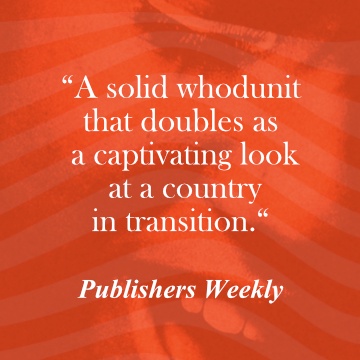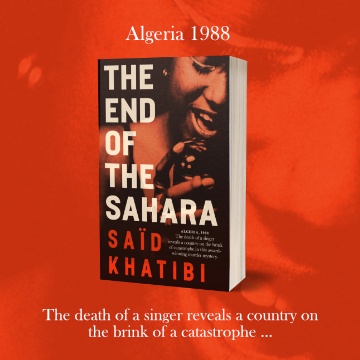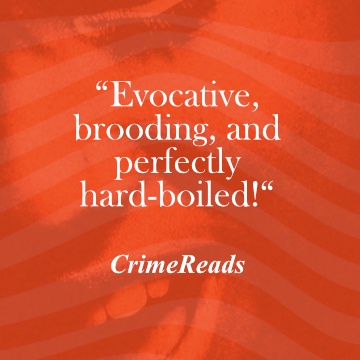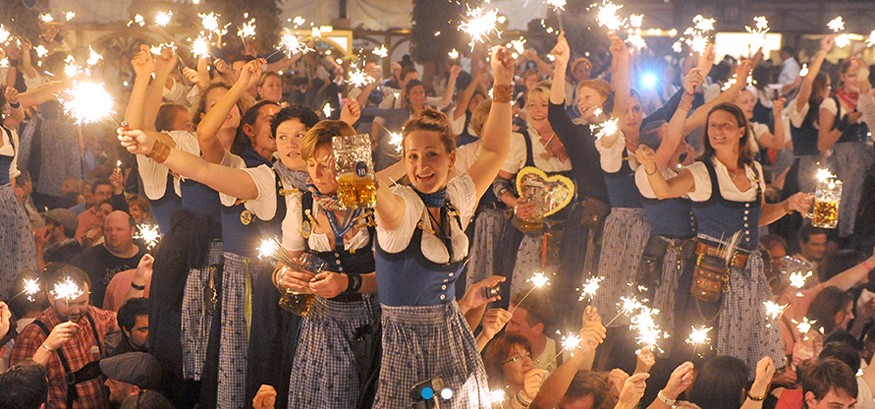
It’s Oktoberfest season in Germany and images of beer-drinking, sausage-munching, lederhosen-wearing crowds are probably what you have in mind. However, this is also the time for Krimifestival Munich, one of the largest crime festivals in Europe. It’s well known that the Germans love crime novels, although German crime fiction hasn’t yet become a big phenomenon in English translation. We decided to turn our attention to one of the biggest areas of the genre for German readers – historical crime fiction – and investigate some of the most interesting authors and their books.
The recent past
When we think of historical crime fiction set in England, it’s the distant past that springs to mind, such as Ellis Peters’ medieval Brother Cadfael series, Susanna Gregory’s 14th century Bartholomew, Michael Jecks’ Knights Templar or CJ Sansom’s Tudor Shardlake series. By contrast, historical crime fiction from the German-speaking world tends to focus on the more immediate past.
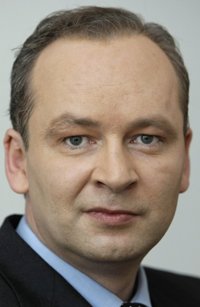
German reunification in 1990 prompted a wide-ranging public discussion about the country’s uneasy double past of fascism and communism. Twenty-five years on, a boom in German-language historical crime fiction testifies to the enduring interest in those eras and other key 20th century events. There is no shortage to choose from: World War I, the collapse of the German and Austro-Hungarian empires, the Weimar Republic and the great depression, National Socialism and World War II, Allied Occupation, the division of Germany and the Cold War, the terrorist movement of the 1970s and the disappearance of East Germany.
A number of those periods have dark, criminal associations, which helps to explain why crime authors are drawn to writing about them and why the genre is a particularly suitable vehicle for exploring their complexities. The capacity of the state to persecute dissenting citizens (Nazi Germany, East Germany), the actions of individuals or groups against the state (Nazi resisters, left-wing terrorists, right-wing neo-Nazis) and the government’s sometimes over-zealous response (an increase in security measures, laws and trials) all provide rich material for the historical crime author’s pen.
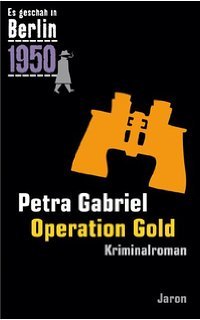
One recent, notable trend is the publication of German-language crime series that explore a significant sweep of 20th century history. The most ambitious of these is the series Es geschah in Berlin (It happened in Berlin), which uses the investigations of Berlin police inspector Hermann Kappe to trace German history from shortly before the collapse of the German empire through to the Cold War era of East and West Germany. To date, 26 novels set at two-year intervals from 1910 to 1960 have appeared, with Hermann’s nephew Otto Kappe taking over investigative duties in 1956. The novels are written by a collective of authors under the editorship of Horst Bosetzky, a well-known German crime writer and sociologist, who conceived the project in 2007 with the publisher Jaron. The series has been dubbed a Kettenroman, or chain novel, which points to its larger aim of becoming an epic, multi-part story that provides a detailed investigation of 20th century German history, with Berlin as a symbolic centre of events. This series has yet to be translated into English.
Another series that performs a similar function but with Austrian history has had one book translated by Ariadne Press. This is Andreas Pittler’s David Bronstein series, which explores that murky, difficult period in Austrian history between 1913 and 1955 through the eyes of a Protestant-Jewish-Viennese policeman. The 5th installment, Inspector Bronstein and the Anschluss, is a fascinating addition to the debate about Austrian culpability or victimhood during the period preceding World War II.
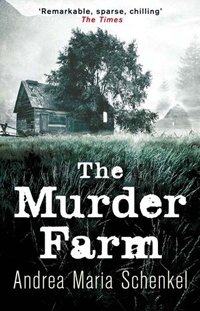
Some further series are starting to reach English-speaking audiences too. The Wet Fish, the first in the best-selling Gereon Rath series set in Berlin in 1929, is out shortly with Sandstone Press. The author Volker Kutscher admits he was inspired by the classic children’s book Emil and the Detectives. If it’s the chaos of post-war Hamburg you are after, Cay Rademacher’s first book in the Inspector Stave trilogy, Murderer in Ruins, has recently been published by Arcadia Press.
Numerous crime standalones also examine the difficult historical legacies of the German-speaking countries and understandably focus on the Nazi past and questions of individual or collective guilt. Post-war reluctance to address the past is the theme of Andrea Maria Schenkel’s prize-winning novel The Murder Farm, transposing a genuine murder case from the 1920s to a rural community in the 1950s. A whole family is murdered with a pickaxe, and the readers have to sift through different voices and interpretations to make up their own minds as to what happened. Meanwhile, Ulrich Knellwolf’s Class Reunion mocks the idea of Swiss wartime neutrality when a former Nazi returns home after decades in Argentina and disrupts his former classmates’ lives.
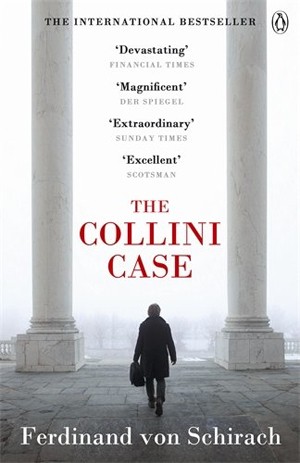
Ferdinand von Schirach’s The Collini Case uses the apparently motiveless murder of an elderly German industrialist to probe the West German judicial system’s failure to prosecute former Nazis effectively. It is given additional resonance by the author’s family background: his grandfather was Baldur von Schirach, leader of the Hitler Youth organisation. The same grappling with the sins of the past, which have gone unpunished, and whether it’s right to avenge them years later, are themes in Swiss writer Friedrich Dürrenmatt’s The Judge and His Hangman.
Don’t mention The War
Other crime authors explore post-war German history more widely. Bernhard Schlink is better known for his literary novel The Reader, but he has also written a trilogy featuring a detective called Self, covering not only the legacy of the Nazi past (Self’s Punishment) but also 1970s terrorism (Self’s Deception) and the collapse of East Germany (Self’s Murder).
The pain and disillusionment of German reunification for young Berliners is presented in Zoran Drvenkar’s cynical take on criminal entrepreneurship entitled Sorry. Jakob Arjouni gave us the Turkish-German private investigator Kemal Kayankaya. In the fourth book in the series, Kismet, the character wrestles with the fall-out from the collapse of communism and the Balkan wars when organised crime from Eastern Europe arrives in his home city of Frankfurt. In his last novel, Brother Kemal, Arjouni tackles issues such as immigration, failed assimilation and religious intolerance, which are more timely than ever during the refugee crisis in Europe. Finally, Simon Urban’s alternative history Plan D, set in a 2011 East Germany in which the Berlin Wall still stands, uses police procedural and hardboiled detective novel conventions to take a wry look at post-war history and the terms of German reunification.
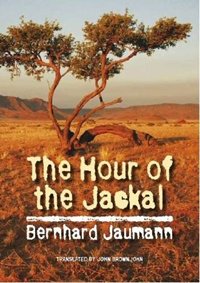
A notable exception to the dominant focus on internal history is the author Bernhard Jaumann, with his series of novels set in contemporary Namibia and exploring the long-term effects of German colonialism. The tense, atmospheric political thriller The Hour of Jackal is a reconstruction of a real-life unsolved case, while Steinland (not yet translated) examines the fall-out from the Namibian government’s recent land reform policies, which aim to return farmland acquired by German settlers during colonial rule to black communities.
Why so serious?
One of the primary aims of historical crime fiction (much like the crime genre as a whole) is to provide readers with gripping and entertaining narratives. The English-language authors writing crime fiction set in Germany (for example, Philip Kerr, Alan Furst or David Downing) are particularly adept at using the historical backdrop to enhance the chill factor in their stories.
For the German-language contingent, the professions of a number of these historical crime writers – such as barrister (von Schirach), judge (Schlink), pastor (Knellwolf) and teacher (Jaumann) – suggest that there is often a more serious purpose to their works. They aim to educate readers about particular eras or events, explore key points of historical debate such as perpetrator motivation or German wartime suffering, and make readers think more deeply about complex issues such as justice. By posing larger historical, political and ethical questions, many crime novels in German harness the genre for ambitious ends and create opportunities for dialogues with a mass readership in the present.
Thank you to our guest contributor Katharina Hall, who is Associate Professor of German at Swansea University, Wales. She is the editor of Crime Fiction in German: Der Krimi (out with University of Wales Press in March 2016), and runs the international crime fiction blog Mrs. Peabody Investigates. You can download a free chapter of her book Crime Fiction in German here.











